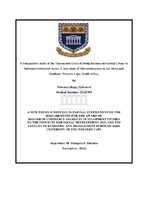| dc.contributor.advisor | Dinbabo, Mulugeta F. | |
| dc.contributor.author | Mahamed, Mahamed Rage | |
| dc.date.accessioned | 2015-05-27T12:04:07Z | |
| dc.date.available | 2015-05-27T12:04:07Z | |
| dc.date.issued | 2014 | |
| dc.identifier.uri | http://hdl.handle.net/11394/4213 | |
| dc.description | Magister Economicae - MEcon | en_US |
| dc.description.abstract | The main objective of this research was to measure and compare the influence of institutions (government laws, rules, regulations) on the transaction cost of establishing microenterprises in informal/township areas and suburbs. The research target area was Maitland (a suburb) and Joe Slovo (a township area). A research framework was developed using the theories of institutions and the TACE. In order to achieve the research objectives, both quantitative and qualitative research designs were used. A total research sample of 40 microenterprise owners were selected from these two areas. A random sampling technique was used to select half (twenty) microenterprise traders in Maitland and the other half (twenty) from Joe Slovo. The research also applied non-random sampling technique to select relevant government institutions that regulate microenterprises in these two areas. The research has collected both primary and secondary data. To collect the primary data, face-to-face interviews were held with the shop owners in the two research sites and government (City) officials. A questionnaire containing both open-ended and closed-ended questions was used in collecting the primary data. The secondary data was collected using desktop (internet) search and also physically searching government archives and publications. Descriptive statistics (frequency distributions and graphical representations) of the data were used to analyze and compare the data collected in a meaningful way. The research also used non-parametric independent samples t-test to compare the differences of the transaction costs of establishing microenterprises in Joe Slovo and in Maitland. The data collected was analyzed and compared using SPSS statistical research analysis software. The results show, to establish a microenterprise business, microenterprise owners in both formal and informal areas need to comply with the environmental health laws. In addition to complying with the environmental health laws, microenterprises in formal areas are obliged to comply with the City zoning scheme and seek permission to establish businesses in these areas. The application process for seeking the City zoning approval is cumbersome and subjective. The results show that entrepreneurs in informal/township areas are automatically allowed by the local government to establish microenterprises in these areas and need not comply with the Zoning Scheme. The main findings of the study reveal that microenterprises in formal suburbs face higher TACs in establishing businesses in these areas when compared to those in township areas. | en_US |
| dc.language.iso | en | en_US |
| dc.publisher | University of the Western Cape | en_US |
| dc.subject | Spaza shop | en_US |
| dc.subject | Microenterprises | en_US |
| dc.subject | Transaction cost economics | en_US |
| dc.title | A comparative study of the transaction costs of doing business in formal urban vs informal settlement areas: a case study of microenterprises in Joe Slovo and Maitland, Western Cape, South Africa | en_US |
| dc.rights.holder | University of the Western Cape | en_US |

